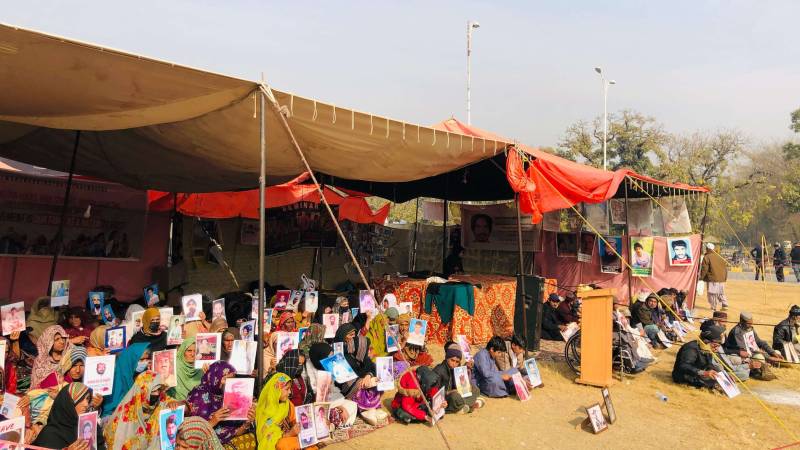
For 50 days, residents of Balochistan have been protesting and marching across the country. They have braved the freezing cold, arrests, harassment and intimidation to raise their voice about the enforced disappearances of their kinsmen and the alleged extrajudicial murder of some.
The protests erupted after the case of Baloch youngster Balaach Mola Bakhsh surfaced. Bakhsh was forcibly disappeared from his home on October 29. He was later presented in court by the Counter Terrorism Department (CTD) of Balochistan on November 21. But just two days later, he was reportedly killed in a disputed encounter on November 23.
This incident sparked widespread outrage in Balochistan and fueled protests across the country. The main protests were led by the Baloch Yakjehti Committee, who first marched from Turbat to the provincial capital of Quetta and then on to the federal capital of Islamabad. The Baloch March completed its 50th day on January 11.
The march to protest illegitimate and indiscriminate violence against the Baloch has seen arrests, baton charges, and alleged police brutality against its participants, including the women and children who have marched, often on foot, across the length of the country.
Despite attempts by the authorities and powers that be to suppress the movement, it continues to gain momentum.
Despite its peaceful nature, the state's response to the march has been characterised by arrests, lodging of fake cases, and attempts to undermine the movement through misinformation
The ongoing sit-in in Islamabad has been going on for nearly a month and has faced numerous challenges. Attempts were made to prevent the marchers from reaching the federal capital. Then, when they managed to reach the capital, they were denied entry. It took court orders to ensure the release of protesters, who then finally camped at the National Press Club.
More recently, armed individuals threatened Baloch women participating in the protest; the sound system set up by the marchers was seized, which raised concerns about the security provided by the Islamabad Police to peaceful demonstrators.
The Baloch Marchers have accused the police of being complicit in the harassment of Pakistanis protesting peacefully rather than ensuring their safety, as is their duty.
On the 50th day of the Baloch March, its leader, Dr Mahrang Baloch, highlighted the challenges faced by the demonstrators. She emphasised the involvement of state and non-state actors in attempting to escalate rather than defuse the situation and urged the international community, particularly the United Nations, to intervene.
In a significant announcement, Dr Mahrang stated that the sit-in camp would relocate from the National Press Club to the United Nations office in Islamabad.
As the Baloch March enters its third week in Islamabad, it remains largely ignored by the government, the judiciary, and other stakeholders.
Despite its peaceful nature, the state's response to the march has been characterised by arrests, lodging of fake cases, and attempts to undermine the movement through misinformation.
Caretaker Prime Minister Anwaarul Haq Kakar, who hails from Balochistan, labelled the protesters and their supporters as potential militants. It further illustrates the government's reluctance to address the legitimate demands of the Baloch protesters.
With more than 20 new cases of enforced disappearances reported during the march, concerns have grown over the state's commitment to resolving the crisis. The families of missing persons joining the sit-in from Balochistan face accusations of terrorist sympathies, exacerbating tensions.
Expressing dissatisfaction with the Pakistani government's response, the Baloch protesters now look towards the international community for intervention and resolution.
This historic women-led March, the largest in Balochistan's history, underscores the urgency for the government to address the legitimate demands of the Baloch Marchers before the situation escalates further.

